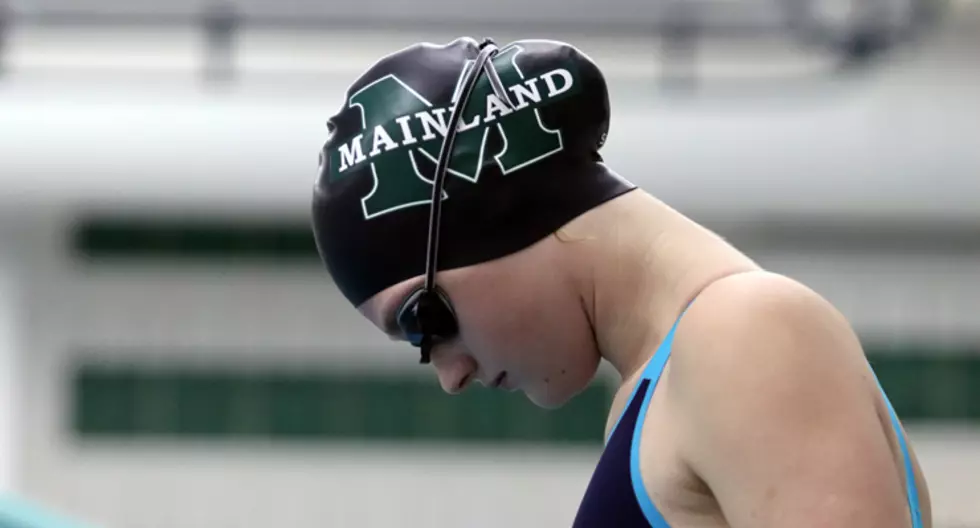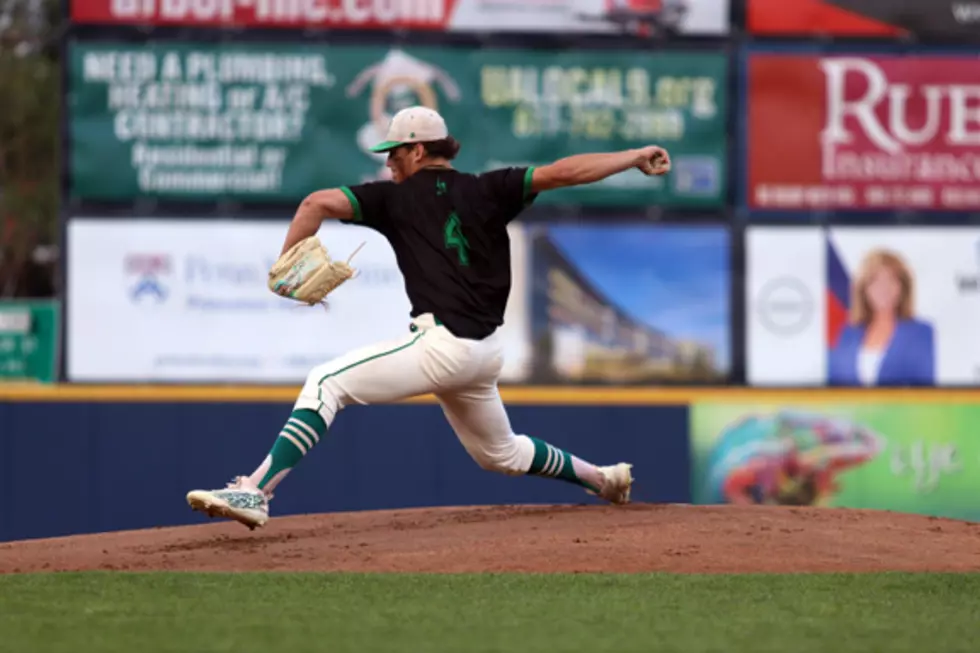
South Jersey Sports Report: Mainland Girls Swim Team had Success in a Unconventional Way
High school swimming is unlike any other prep sport in that in order to be successful, a team must have club swimmers — athletes who compete in swimming all year and train with their clubs, even during the high school season. It’s a very strange setup, as high school coaches can sometimes have a completely different roster during meets than the one they are tasked with coaching up during practices after school.
It can be very difficult to build a successful swimming program with a lot of club swimmers because it can be tough to build team chemistry, but it’s also a tall order to try to win meets without a lot of club swimmers. The Mainland Regional girls program has somehow found a way to do both — keep team chemistry when the best club swimmers aren’t at practice, while also becoming a conference champion with less than a third of its team coming from the club ranks.
Coach Mike Schiavo had 35 girls on his roster when the season ended earlier this month and only nine of them were club swimmers. Still, the Mustangs went 13-1 this season and won the Cape-Atlantic League American Conference with a 6-0 mark and also made it to the South Jersey Public B championship meet for the first time in seven years.
“We definitely have some very talented club swimmers. They put their mind to it and they put the work in. But for the other girls who don’t do club, we’re still her six days a week putting in all that work,” said senior Grace Gallagher, who had no swimming experience prior to her freshman year, and who is not a club swimmer. “It goes to show that if you love the sport and if the opportunity in high school presents itself, just go for it because you never know what can come from it.”
“It’s something I’ve always taken a lot of pride in. I coached at Holy Spirit for 21 years and we ended up six times for the boys state champions and one time for the girls. We’d be going up against schools like CBA or St. Joseph-Metuchen, and you name the amazing girls teams that had all club teams. Historically, the teams I’ve coached have not been all club kids, and I really like that. For those three months, the girls are really committed to focusing all their energies and efforts — outside of school and their families — on this sport,” Schiavo said. “They are focused on those three months and we’re all going through everything at the same time. They’re all getting in shape, they’re all getting sick together, going through the inevitable ups and down, and they’re all dropping a lot of time by the end of the season. That’s difficult when you have a lot of club kids because their cycle of work is different because their big meets are different. Typically, there is a conflict there, and it takes a couple years for club kids to figure out everything.
“We’ve had more club kids than we’ve had in a while and that’s made us stronger, so I definitely want to make sure those girls understand they are a huge part of this team even if they are not here every day,” he added. “Inevitably — and this is something I really enjoy — those club kids really come to love high school swimming, at least in my experience. We throw out the welcome mat and we certainly applaud all their efforts outside of the high school season — I don’t ever want them to feel bad about what they miss in the high school season. But a lot of them swim their fastest times ever during a high school meet, instead of a club meet. That’s the thing that’s crazy to me. Maybe not the Katie McClintocks of the world, but a notch below, the club kids get so fired up to swim for their high school teammates. And not just with, but for their teammates. It’s tough for them to reproduce that excitement when they are one of a thousand swimmers on deck.”
Gallagher said she agrees that swimming can lead to some great relationships among the athletes.
“I have made two of my absolute best friends from this team,” she said. “You’re with each other for a couple hours a day and you get close no matter what — whether you are complete strangers or have known each other for years. That bond is definitely there.”
Schiavo said he credits his 10 seniors with creating the kind of atmosphere that is positive for everyone from the best club swimmers to freshman novice swimmers.
“In this year’s senior class, and there were 10 of them, they are just phenomenal kids. All of them are really good students, so involved in this school in so many different ways, and leaders in their own right,” Schiavo said. “I’ve said this before, but out of those seniors, there are only two who really score points for us. Yet the others keep coming back because they feel like they are an important part of the team. And they understand what everyone is going through every day, so all the new girls who come out who don’t have experience and may not end up contributing in meets all the time, these seniors know what it’s like to be that kid and they can connect with them and continue to think positive, and grow, and feel like they are a part of things.”
Schiavo said it’s not always easy to integrate incoming freshmen who are accomplished club swimmers into the much different atmosphere that is high school swimming. But he said eventually they come to love being a part of their respective high school team.
“A couple of our girls were commenting up at the South Jersey final against Moorestown that it seemed like two-thirds of their girls never even got in the water. They noticed it. But, on the other side of that, coaches who can create a successful team where the majority of their swimmers aren’t there every day, my hat’s off to them. That’s tough to do,” he said. “That’s always in the back of my mind. This year, we had five incoming freshman with club experience and I always worry how connected will they feel? How much will they end up caring about their teammates? And that’s why I was so fired up to have those 10 seniors this year to be role models, to open their arms and welcome them, to organize social activities outside of the pool to connect with them so they did end up caring very quickly. They might not understand it all right away — freshman year for club kids, they don’t get it, but by the end of their first year they are like, ‘OK, I got it, I love my teammates and I’m here for them.’ I love seeing that. To me, for any sport or any coach, that’s what you want to see. You’re not going to remember how fast you swam but you’ll remember those moments with your friends when it’s all said and done.”
Contact Dave O’Sullivan: sully@acglorydays.com; on Twitter @GDsullysays
More From 97.3 ESPN








![[WATCH LIVE] Mainalnd Mustangs vs Holy Spirit Spartans](http://townsquare.media/site/399/files/2021/04/ChasePetty.jpeg?w=980&q=75)
